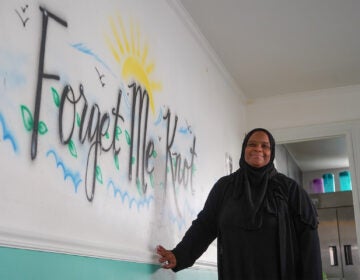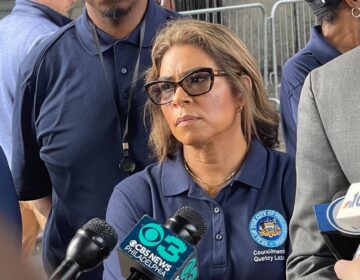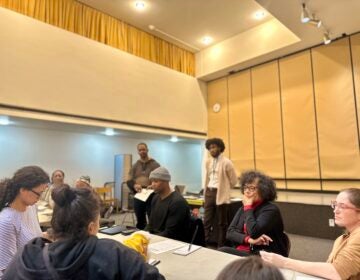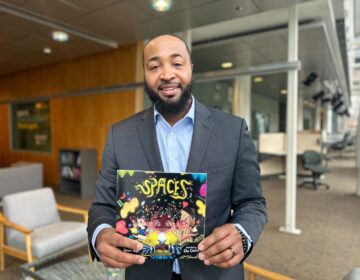It’s cold out. Here’s how you can help your unhoused neighbors in the Philly area
Thousands of people in the Philadelphia area experience homelessness. Here are five ways to help.
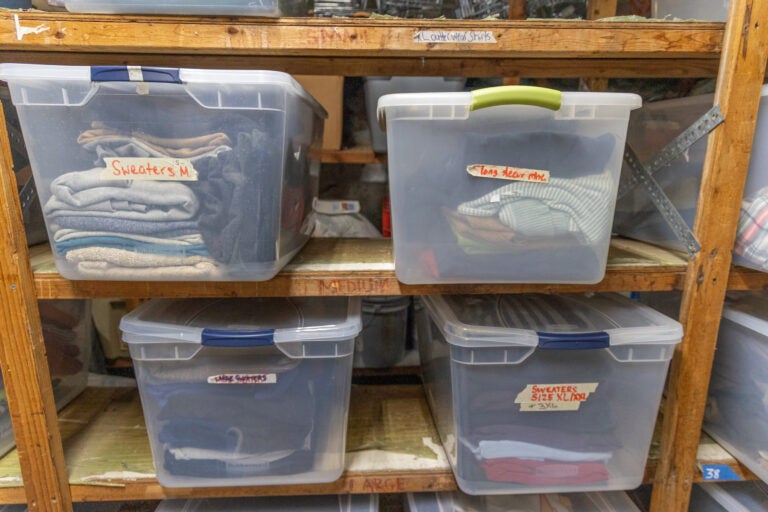
Warm clothes available for people experiencing homelessness at the Bethesda Project in Philadelphia. (Kimberly Paynter/WHYY)
This story is from Young, Unhoused and Unseen, a podcast production from WHYY News and Temple University’s Logan Center for Urban Investigative Reporting.
Find it on Apple Podcasts, Spotify, or wherever you get your podcasts.
Thousands of people in the Philadelphia area are unhoused. Of those, hundreds are unsheltered.
Homelessness is dangerous, relentless, and hard to get out of. It can also be deadly, particularly in the winter. In Philadelphia, people die every year from exposure to the cold.
So how can you help?
1. Give directly
One way you can help people experiencing homelessness meet their daily needs and stay safe is to give directly.
“Sometimes people want things. Sometimes people want cash,” said Raani Begum, an organizer with Project Safe, a Kensington-based mutual aid group focused on harm reduction for women and queer people. “Start getting to know [your] own unhoused neighbors. Who is in the community who is unhoused? And what is it that they’re asking for?”
Kharisma Goldston, director of shelter at the Bethesda Project, recommends introducing yourself and asking whether someone needs help, and if so, what would be most useful.
“That includes a person in that conversation as opposed to it being like a parental kind of relationship,” she said.
If you don’t have cash on you, Goldston recommends offering to buy someone a hot drink or food. Mark Boorse, who does street outreach in Montgomery County with the nonprofit Access Services, recommends giving bottled water, socks — particularly thick wool socks — gloves, hand warmers, and hats. He’s known for carrying instant coffee, cigarettes, and pop tarts.
There’s more than one way to help.
“People say to me, I don’t want to give somebody money,” Boorse said. “That’s OK, just find something that you feel comfortable with … Every single one of us can do a simple thing in a moment … It doesn’t take much to offer relief.”
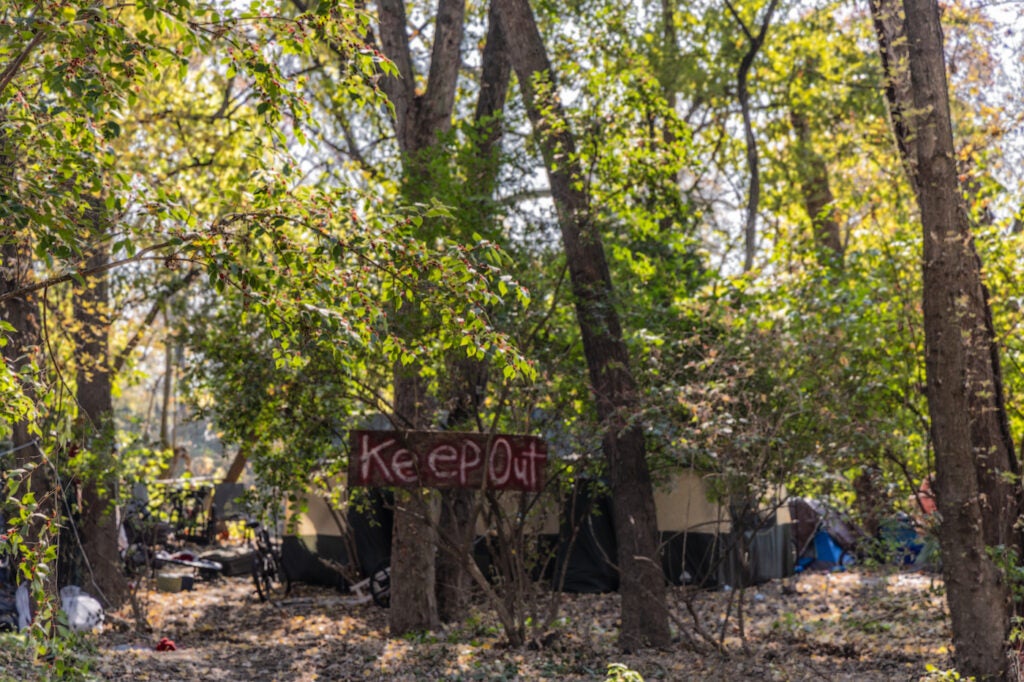
2. Donate to service providers and mutual aid
Another way to help is to donate to organizations or mutual aid groups doing work you believe in.
If you plan to donate goods, make sure to do research first to figure out what an organization or group actually needs.
Project HOME in Philadelphia receives lots of donations, said Candice Player, the vice president of outreach and special initiatives. But sometimes, they’re the wrong kind.
“We find that we’re receiving women’s clothing, but serving lots of unsheltered men,” she said. “So there’s a particular need for men’s clothing, particularly shoes or sneakers that are good for outdoor use. If someone wanted to help, that’s a wonderful way to donate.”
Many organizations post donation guides on their websites. For example, Pottstown Beacon of Hope, a seasonal winter shelter in Pottstown, has a wish list that includes plastic gloves, paper towels, and camping backpacks. High-need items for the Bethesda Project in Philly include Lyft gift cards for rides to appointments, universal phone chargers, and KN95 masks. A coalition of mutual aid groups in Philly, including Project Safe, is seeking warm clothing, coats, and heaters.
The city of Philadelphia’s Office of Homeless Services recommends donating money to the Philadelphia City Fund. OHS administers the money in the form of competitive grants to nonprofits throughout the city, for things including permanent housing, rental assistance, and social services.
3. Offer to call a hotline or refer someone to an intake center
If you meet someone experiencing homelessness who needs help connecting to a shelter or other services, there may be a hotline in your area you can call.
In Philadelphia, Project HOME operates a 24/7 phone hotline to connect people experiencing homelessness with resources. In Montgomery County, the number is 211.
Just make sure to ask before doing this, advocates said.
“Talk to the person that you want to call the hotline for. They will tell you, yes or no,” Begum said. “If they are asleep, make sure that they’re breathing. Make sure that their heartbeat is running. If they wake up, and you are trying to make sure that they’re okay, ask them if they would like somebody to be called … Sometimes they’ll say yes, call a hotline. Sometimes they’ll say no, I’d rather a ride be called or … somebody else that can give me another kind of help.”
Goldston says don’t call 911 on someone experiencing homelessness unless there’s a legitimate risk that they could die outside in the cold.
“I don’t believe in calling the police on people because they’re experiencing homelessness,” she said. “I do believe in calling EMS when someone is in need of services and they’re outside.”
In Philadelphia, you can also refer someone to a city-funded homeless intake center where they can learn about what help is available.
4. Volunteer
Many organizations and groups that provide resources and shelter to people experiencing homelessness need volunteers.
“Our volunteers kind of hold us all together — hold the whole organization together,” said Tom Niarhos, director of the Pottstown Beacon of Hope Warming Center — a seasonal nightly shelter for individual adults in Pottstown. The organization is seeking volunteers to help with cooking and serving meals, cleaning and other tasks, with a place to sign up online.
Goldston recommends calling your local shelters to see what help is needed. The Bethesda Project takes volunteers for tasks from data entry to construction.
There are also plenty of mutual aid groups and other grassroots efforts to provide supplies and support for unhoused community members. You could even start something yourself.
“The goal should never be charity,” Begum said. The mutual aid group they organize with is a collective by and for drug users and sex workers. “The goal should never be, you know, I’m collecting the stuff and I’m gonna give it to people and I feel good about myself and I’m gonna walk away. The goal should always be, how do I build a relationship with people who are in my community.”
Many organizations get a surge in support around the holidays, so make sure to continue showing up year-round, Goldston said.
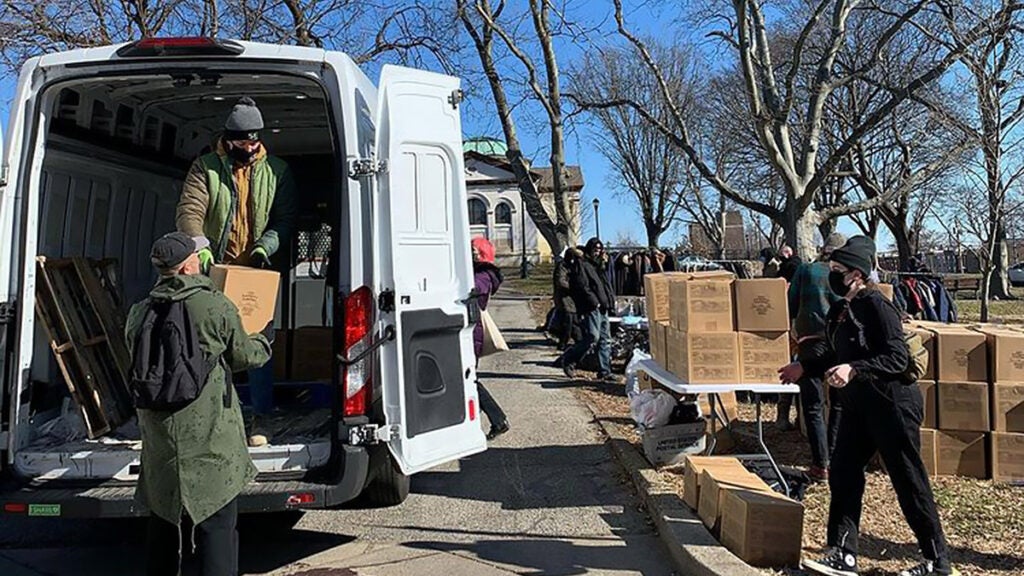
5. Support systemic solutions
Other ways to help include educating yourself about the root causes of homelessness, learning to debunk myths about it, and using your voice to push for systemic solutions.
“Fundamentally, there’s a lack of affordable and accessible housing,” said Dennis Culhane, a homelessness researcher at the University of Pennsylvania. “If there were enough units that were rentable at a price that very low-income people could afford… most of the people who experience homelessness could avoid homelessness.”
Local zoning laws and opposition from neighbors are often roadblocks to building more affordable housing. In Philadelphia, City Council has passed legislation requiring market-rate multi-family buildings set aside a certain number of affordable units, but it only applies to small parts of the city.
Goldston recommends using your vote to elect candidates working toward real solutions.
“Look at who is on the ballots and who’s supporting ending of homelessness – who supports more funding for affordable housing,” she said.
Culhane said people should also push the city and state to scale up rapid rehousing programs, which he said are effective at reducing the duration of homelessness and preventing people from becoming chronically homeless.
“I would encourage citizens to take a more active role in the policy-making process,” Culhane said. “Don’t leave it just to the elected [officials], but actually push the officials … into making the right decisions.”
And remember to take your cues from your unhoused neighbors.
“Actually seeing unhoused people as people worth fighting with, not simply worth fighting for — I think for me is the cornerstone of the work that I do,” Begum said.

Get daily updates from WHYY News!
WHYY is your source for fact-based, in-depth journalism and information. As a nonprofit organization, we rely on financial support from readers like you. Please give today.



